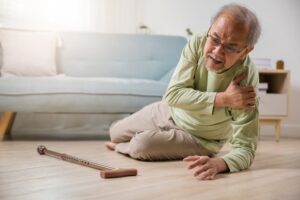Can You Sue a Nursing Home for a Fall?
Abuse and NeglectAs we age, our bodies become more vulnerable to injuries and accidents, and falls, in particular, pose a significant threat to seniors, especially those residing in nursing homes. Unfortunately, falls are a common occurrence in nursing homes, often resulting in severe injuries or even fatalities.
If you or a loved one experienced a fall in a nursing home, you might sue the facility for negligence. This blog post explores the legal avenues available and underscores the importance of consulting with a nursing home abuse attorney when pursuing such a case.
The Dangers of Nursing Home Falls

According to the Centers for Disease Control (CDC), a typical nursing home with about 100 beds reports an average of 100 to 200 falls annually, with some residents falling multiple times yearly.
Falls in nursing homes happen at twice the rate that older adults who aren’t in facilities, and over one-third of nursing home falls involve residents who can’t walk.
Up to 20 percent of falls in nursing homes cause severe injuries to the victim, and nearly 2,000 sustain fatal injuries as a result of their falls annually.
About 25 percent of these falls are due to facility hazards, which may include:
- Incorrect bed height
- Wet floors
- Defective wheelchairs
- Poor lighting
Sadly, once an older adult has fallen once, their risk of falling again doubles.
Understanding the Complexity of Nursing Home Fall Cases
Understanding the complexity of nursing home fall cases is crucial. Filing a lawsuit against a nursing home for a fall is not simple and requires a thorough investigation to establish liability.
Several factors come into play when evaluating the potential success of a lawsuit, including negligence, pre-existing conditions, documentation, and the statute of limitations.
Negligence
Demonstrating negligence requires illustrating that the nursing home didn’t uphold a reasonable standard of care, leading to the fall. Factors such as inadequate staffing, insufficient staff training, or environmental hazards contribute to establishing negligence.
Pre-Existing Conditions
The defense may argue that the fall resulted from a pre-existing condition or the resident’s negligence. Gathering medical records and evidence is essential to counter such claims.
Documentation
Strong evidence is paramount in any legal case. Thorough documentation of the fall incident, including witness statements, medical records, and incident reports, significantly strengthens the case.
Statute of Limitations
Each state has a statute of limitations dictating the timeframe for filing a lawsuit. Consulting with an attorney promptly is crucial to avoid missing the deadline.
Proving Nursing Home Negligence After a Fall
Unfortunately, falls in nursing homes are common occurrences, with serious consequences for the well-being of the residents. If you or a loved one suffered a fall in a nursing home, a lawyer can explain your legal options.
Proving nursing home negligence after a fall requires a comprehensive understanding of the relevant laws and gathering sufficient evidence to support your claim.
To establish nursing home negligence, you must show the facility breached its duty of care towards the resident. Nursing homes and similar facilities have a legal and ethical obligation to provide a safe environment for their residents, including implementing proper fall prevention measures.
This duty includes:
- Regularly assessing each resident’s risk of falling
- Developing individualized care plans
- Implementing preventive measures such as installing handrails and using bed alarms
To build a strong case, gathering evidence supporting your nursing home negligence claim is crucial, including medical records, witness statements, incident reports, video surveillance footage, and expert testimony.
Medical records are especially important, as they can provide insight into any underlying medical conditions or medications that may have contributed to the fall.
In addition to gathering evidence, it is essential to establish a causal link between the nursing home’s negligence and the resident’s fall. This can be done by showing that the fall would not have occurred if the facility had fulfilled its duty of care.
Expert testimony can be crucial in connecting the dots between the nursing home’s actions or inactions and the resident’s injuries.
Proving nursing home negligence often requires an experienced nursing home injury attorney.
A knowledgeable attorney can navigate the legal ins and outs, help gather and analyze evidence, and stand up for your rights throughout the legal process. They can also provide guidance on the statutes of limitations that apply to your case, which vary by state and can impact your ability to file a lawsuit.
Proving nursing home negligence after a fall requires a thorough investigation and gathering of evidence. Falls in nursing homes can have severe consequences, and holding the facility accountable for its negligence is vital for the safety and well-being of the residents.
An experienced attorney can navigate the legal process and ensure your rights are protected. If you believe you have a case, contact a skilled attorney specializing in nursing home negligence to discuss your options.
What Causes Nursing Home Negligence?
 Nursing home negligence can be attributed to various factors, significantly impacting the residents’ well-being. One key contributor is these facilities’ lack of oversight and supervision and low staff morale. However, the most substantial factor often revolves around staffing issues, presenting a pervasive challenge for nursing homes.
Nursing home negligence can be attributed to various factors, significantly impacting the residents’ well-being. One key contributor is these facilities’ lack of oversight and supervision and low staff morale. However, the most substantial factor often revolves around staffing issues, presenting a pervasive challenge for nursing homes.
Quality staff recruitment and retention pose significant hurdles for nursing homes. Even when these facilities manage to secure quality staff, inadequate training becomes a prevalent issue.
The combination of understaffing and insufficient training creates an environment where providing the necessary care to all residents becomes challenging. The limitations of even the most reputable nurses or nurse’s aides during a single shift contribute to an overburdened system, leading to a higher staff turnover rate.
The ongoing cycle of staffing challenges perpetuates the problem of neglect in nursing homes, compromising the safety and care of residents. To address these issues and ensure the well-being of your loved one, seek legal assistance from a nursing home attorney.
An attorney can provide insights into your loved one’s legal rights, explain available options, and guide you on the most appropriate course of action to pursue justice.
Nursing Home Fall Injuries: Understanding the Consequences and Seeking Justice
As individuals age and move into nursing homes, the risk of falls becomes a significant concern, and the consequences of such incidents can be severe.
Nursing home fall injuries are unfortunately common and can lead to a range of physical, emotional, and financial challenges for the impacted individuals and their families.
Understanding the nature of these injuries, their causes, and the subsequent legal implications is crucial for ensuring the safety and well-being of nursing home residents.
Common Nursing Home Fall Injuries
- Fractures and Broken Bones: Falls can result in fractures and broken bones, often affecting vulnerable areas such as the hips, wrists, and ankles. Fractures, particularly in older individuals, can have prolonged recovery periods and may lead to a decline in overall health or even death, especially if they broke their hip.
- Head Injuries: These injuries are a serious concern in nursing home falls. Elderly individuals are more prone to traumatic brain injuries (TBI), which can have long-term consequences, including cognitive impairment, memory loss, and changes in behavior.
- Soft Tissue Injuries: Falls can cause various soft tissue injuries, including sprains, strains, and contusions. While these injuries may be less severe than fractures or head injuries, they can still result in pain, discomfort, and reduced mobility.
- Psychological Impact: Nursing home fall injuries can have a profound psychological impact on residents. Fear of falling again, anxiety, and depression are common consequences. These emotional challenges can further compromise the individual’s overall well-being.
- Wrongful Death: In the most tragic cases, nursing home falls can lead to wrongful death. Frail and elderly residents may succumb to their injuries, highlighting the critical importance of preventing such incidents in care facilities.
Causes of Nursing Home Falls
Negligence
Negligence on the part of nursing home staff, including inadequate supervision, insufficient training, and failure to address hazards, can contribute to falls. Staffing shortages may result in delayed responses to residents’ needs, increasing the risk of accidents.
Environmental Hazards
Poorly maintained facilities, wet floors, inadequate lighting, and cluttered hallways create environmental hazards that significantly increase the likelihood of falls. These hazards underscore the responsibility of nursing homes to provide a safe living environment for residents.
Lack of Fall Prevention Programs
Nursing homes are expected to implement fall prevention programs, including assessing residents’ fall risks, implementing safety measures, and providing necessary assistive devices. Failure to establish and follow these programs can lead to preventable falls.
Legal Implications and Seeking Justice
Families and individuals affected by nursing home fall injuries have legal options to pursue justice and compensation for the harm caused. A skilled nursing home attorney can navigate the legal complexities associated with these cases.
Legal actions may include:
- Negligence Claims: Holding the nursing home accountable for negligence, whether in terms of inadequate supervision, lack of fall prevention measures, or insufficient staff training.
- Compensation for Damages: Pursuing financial compensation for medical expenses, pain and suffering, emotional distress, and other economic and non-economic damages resulting from the nursing home fall.
- Facility Accountability: Advocating for increased safety measures within the nursing home, such as improved staff training, regular hazard assessments, and enhanced fall prevention programs.
- Wrongful Death Claims: Pursuing wrongful death claims if a loved one succumbs to injuries sustained in a nursing home fall.
Understanding the consequences of nursing home fall injuries is crucial for residents and their families. By recognizing the causes, advocating for improved safety measures, and seeking legal recourse when necessary, individuals can contribute to the well-being and protection of vulnerable nursing home residents.
Why You Need a Nursing Home Attorney

Navigating the legal intricacies can be daunting, especially in complex cases like nursing home falls. Engaging a nursing home attorney dramatically enhances the likelihood of a favorable outcome. Here’s why seeking legal representation is essential:
Knowledge and Experience
Nursing home attorneys understand elder abuse, neglect, and personal injury cases. Their in-depth understanding of laws and regulations governing nursing homes and residents’ rights enables them to navigate the legal process efficiently.
Investigation and Evidence Gathering
Building a robust case necessitates extensive investigation and evidence gathering. Nursing home attorneys possess the resources and knowledge to collect the necessary evidence, including medical records, incident reports, and witness testimonies.
Legal Strategy
Experienced attorneys develop a strategic plan tailored to each case, analyzing facts, assessing potential success, and advising on the best course of action. Their representation ensures the protection of your rights and the best chance of obtaining compensation.
Negotiation Skills
Many nursing home fall cases can be resolved through negotiations or mediation. Skilled attorneys negotiate on your behalf to reach a fair settlement, preventing exploitation by the opposing party.
Trial Representation
In instances where settlements are unattainable, a nursing home attorney provides skilled representation during trial. Advocating for you in court, presenting evidence persuasively, and navigating legal proceedings contribute to a stronger position and increased chances of a favorable verdict.
Contact a Nursing Home Injury Lawyer Today
You can sue a nursing home for a fall if the incident resulted from negligence or inadequate care on the part of the facility. Nursing homes have a legal obligation to ensure the safety and well-being of their residents. You can hold them accountable through legal action if they fail to meet this duty. Remember, each case is unique, and the outcome will depend on the specific circumstances surrounding the fall and the evidence presented.
Consulting with a nursing home abuse attorney is the best way to assess the viability of your case and determine the appropriate course of action. It’s also a crucial step in seeking justice and ensuring accountability in cases of nursing home falls.
Their knowledge, experience, and advocacy play pivotal roles in pursuing the compensation and justice deserved in the aftermath of such incidents. If you or a loved one recently suffered a fall in a nursing home that resulted in injuries, reach out to a Charleston personal injury lawyer today.
Nathan Hughey, an attorney and fourth-generation South Carolinian, founded Hughey Law Firm in 2007. Before that, he spent five years defending nursing homes and insurance companies. Leveraging his experience, he now advocates for those injured or wronged by such entities, securing over $220 million in verdicts and settlements.
